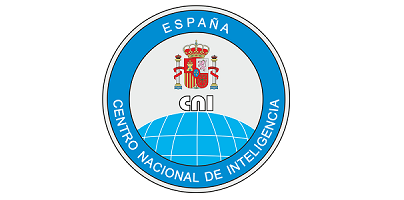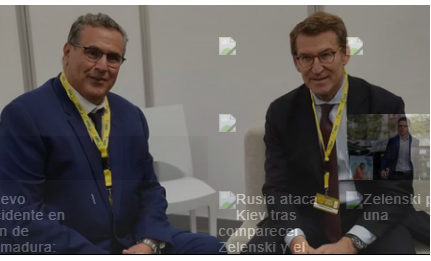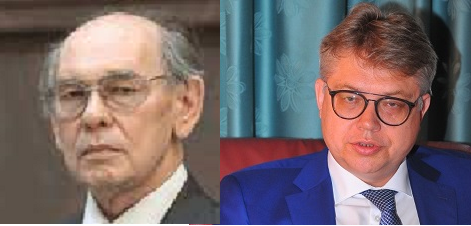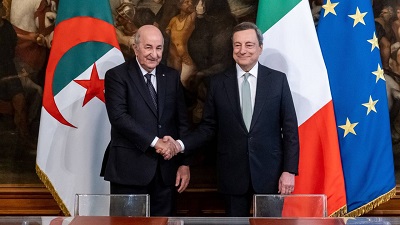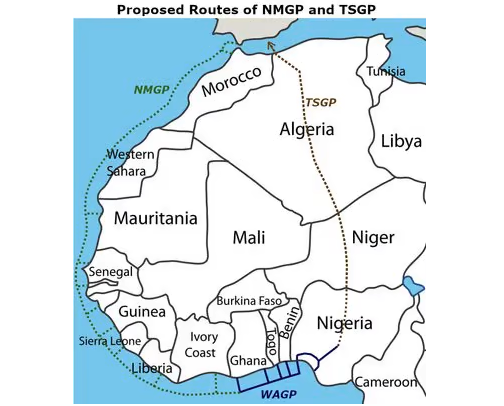Tags : Algeria, Germany, Abdelmadjid Tebboune, Angela Merkel, Western Sahara, Morocco – Tebboune greatly regrets Angela Merkel’s departure
Algerian President Abdelmadjid Tebboune recently closed his country’s airspace to France out of anger at a comment from Emmanuel Macron. DER SPIEGEL spoke with Tebboune about the diplomatic fracas, his country’s path to modernization and why journalists are still being locked up in Algeria.
The road leading to the presidential palace in Algiers winds its way up to a barrier manned by heavily armed military guards. Behind them are the expansive palace grounds, with whitewashed buildings, verdant courtyards and burbling fountains.
Since December 2019, the palace has been occupied by Abdelmadjid Tebboune. The 75-year-old became president after two decades of rule by Abdelaziz Bouteflika, that sickly, aging autocrat who, toward the end of his reign, ran the country from a seaside villa, supported by the all-powerful military. But by spring 2019, Algerians had had enough of the corrupt, incompetent Bouteflika and poured into the streets by the hundreds of thousands, triggered by the president’s announcement that he intended to run for a fifth term in office. The protest movement, which came to be known as Hirak, forced him to step aside that same year. In December elections, Tebboune received the most votes.
At just 40 percent, though, voter turnout was historically low. Many who had joined the protest movement boycotted the election. They had been hoping for a longer interval between Bouteflika’s resignation and new elections, which would have given Hirak more time to organize. But the army pushed through the vote, for which just five out of 23 candidates were certified – all of whom were products of the country’s entrenched power structures.
Algeria is a key country for Europe from both a strategic and political perspective. Migrant routes run through the country, used by people from sub-Saharan Africa and others eager to reach Europe. And Algeria also supplies natural gas to Spain and other European countries. The largest country in Africa by area, Algeria shares a border with northern Mali, a restful region controlled by various groups, some of them Islamist, where French and German troops have been the target of repeat attacks. The country’s other neighbors include Libya, Tunisia and Morocco. As such, the government in Algiers plays a vital role of mediator and as guarantor of security – when it actually decides to take on the task.
Tebboune is currently attempting to reposition his country on foreign policy, seeking to establish closer ties to new partners like the United States, Italy and Germany, in part as a way of distancing his country from the former colonial power of France. In October, he broke off diplomatic relations with Paris and is allegedly is no longer taking calls from the office of French President Emmanuel Macron, with whom he used to maintain close contact. Withstanding such crises, say those close to Tebboune, is part of Algeria’s newfound sovereignty.
DER SPIEGEL: Mr. President, in a conversation with young Algerians in late September, the French president raised the question as to whether Algeria had even been a nation prior to its colonization by France. You immediately broke off diplomatic relations in response. Is a single sentence enough to justify such a reaction?
Tebboune: You can’t question a people’s history and you can’t insult the Algerians. What was revealed there was the old hatred harbored by the colonial masters, though I know that Macron is far away from thinking in that manner. Why did he say that? I think it was for reasons of campaign strategy. It is the same discourse that has long been pursued by right-wing extremist journalist Éric Zemmour: Algeria wasn’t a nation, he claims, it was France that transformed it into a nation. With his comment, Macron placed himself on the same side with those who justify colonization.
DER SPIEGEL: But until that point, you got along well with Macron. You were involved in joint projects, including taking a new look at your nations’ histories. Do you regret the current crisis?
Tebboune: I have no regrets. Macron reignited an old conflict completely unnecessarily. When Zemmour says something like that, who cares? Nobody pays attention to him. But when a head of state claims that Algeria wasn’t an independent nation, that is very serious. I won’t be the one to take the first step. Otherwise, I’ll lose the support of all Algerians. It’s not about me, it’s about a national problem. No Algerian would accept it were I to initiate contact with those who insulted us.
DER SPIEGEL: Last year, the French president commissioned a report from a historian who has been asked to make recommendations for how Paris should deal with its colonial history. What did you expect from him, from France? An apology?
Tebboune: Our country doesn’t need an apology from Macron for something that happened in 1830 or 1840. But we do want a complete and unreserved recognition of the crimes that France committed. And Macron has already done so. In 2017, he declared publicly that colonization had been a crime against humanity. You know, the Germans destroyed an entire village in Oradour-sur-Glane in 1944. That massacre is commemorated to this day, and rightly so. But in Algeria, there were dozens of Oradour-sur-Glanes. The residents of innumerable villages were herded into caves, wood was thrown inside and then set on fire. The people suffocated horrifically.
DER SPIEGEL: So there is no indication that the crisis with France will end any time soon?
Tebboune: No. If the French now want to travel to Mali or Niger, they’ll have to fly for nine hours instead of four. Though we will make exceptions for the recovery of the injured. But when it comes to everything else, we don’t really have to cooperate with each other anymore. Maybe that’s just over. We weren’t subhumans, we weren’t a people of nomadic tribes before the French showed up.
« I greatly admire Angela Merkel’s stamina and her modesty. I greatly regret that she is now going. »
DER SPIEGEL: In your interactions with a different European country, with Germany, your tone has been far more conciliatory. Why? What binds Algeria with Germany?
Tebboune: The Germans have always treated us with respect. They have never approached us with arrogance and there have never been any disagreements on foreign policy. Plus, I greatly admire Angela Merkel’s stamina and her modesty. I greatly regret that she is now going. I will never forget how she personally looked after me when I was in Germany for medical treatment. Germany is a role model for us in many different ways.
DER SPIEGEL: You are also interested in expanding economic ties with Germany. What are your expectations from the new government in Berlin, once it takes office?
Tebboune: To be honest, all that is possible. I would, for example, like to see us build a large hospital in Algiers together. A place that can handle all specialized areas of medical care, for the entire Maghreb. An African president could then finally receive treatment on his own continent instead having to travel to Switzerland. We would be prepared to finance the bulk of this project. There is also a great deal of potential on renewable energies. With German help, we could supply Europe with solar power.
DER SPIEGEL: Two years ago, you promised to put an end to the old way of doing things and initiate a new era in Algeria. How much of that has since come true?
Tebboune: I eliminated taxes for all salaries below 30,000 dinars, around 190 euros, per month. I have increased the minimum wage. Rural regions that have thus far been largely forgotten are receiving special assistance. But one of the most important tasks is that of injecting new morals into the administration and the economy. We have been battling corruption for the last two years.
Tebboune spent enough time as part of the power apparatus in Algiers to know how few scruples Bouteflika had. Over the course of several years, the old head of state transferred billions of dollars out of the country. The new government is still searching the world for the stolen money with the help of consulting firms – in the U.S., in Switzerland and in other European countries. The new government apparently also seized large sums of money in Algeria itself – at least that is what those close to the president claim. Tebboune has also announced numerous economic reforms. But how many of those plans will he actually be able to implement? Is the Ministry of Startups, which he launched, just a bluff or is it really an effort to change things in the country? And what does it mean when the head of the military is on television just as often as the president?
DER SPIEGEL: Before you took office, the military locked up high-ranking members of the old power apparatus, including Bouteflika’s brother Saïd, who was later sentenced. Were additional arrests made on your watch?
Tebboune: Of course. I am currently battling corruption primarily in the lower ranks. What took place at the governmental level was an unforgiveable squandering of this country’s riches. It is the citizens who must pay for day-to-day corruption. But that is now over. Never again should someone have to produce a banknote in a city hall to get a new passport.
DER SPIEGEL: Is it really possible to just change a system and habits that have become ingrained over the course of several decades?
Tebboune: It starts with the fundamental things. We had to completely rebuild the state. We used to have what I would call an informal state. I brought a lot of people from the private economy into government. The government spokesman used to be a television moderator; the man who now leads the Ministry for Startups was part of the 2019 protest movement. We are currently completely revamping the audit office. We are going after tax dodgers. And we have agreed on a new constitution that will grant the citizens more rights.
DER SPIEGEL: And yet, people in Algeria are more frightened of state repression than ever before and are afraid of expressing their opinions. Journalists are being arrested in your country. Are you not just the civilian façade of a continuation of the military regime?
Tebboune: The Algerian people know that isn’t true. I was the one who nominated the chief of the army. In addition to being president, I am also the defense minister. The country’s secret services are under my control and no longer belong to the military. That is the new reality in Algeria, underpinned by the constitution: self-confident action instead of dependencies.
DER SPIEGEL: What is the current balance of power between the army and the president?
Tebboune: I’ll tell you. The chief of the army, who is under my command, received an order from me to modernize the military. Beyond that, he has enough to do with the sensitive situation on our borders. I am the political leader. Nobody will carry out that responsibility in my stead. I was the one who ordered the closure of Algerian airspace for French military flights. I was also the one who did the same for Moroccan aircraft. But it is impossible to get rid of the image the world has of Algeria as a military state.
DER SPIEGEL: There is a passage in the new constitution that allows for Algeria to send soldiers abroad. Are you planning on sending your own troops into Mali?
Tebboune: We can now be asked for help. The UN can turn to us, or the African Union. If the Malians were to find themselves facing an imminent attack, we would intervene if requested to do so. But our soldiers are Algerians who have families. I will not send them to their deaths to defend the interests of others. Enough Algerians have died in the past. The big question in Mali is how the country can be reunited. Algeria, in any case, will never accept the partitioning of Mali.
DER SPIEGEL: France isn’t the only country you are having trouble with. You have also closed Algerian airspace to your neighbor Morocco. Why?
Tebboune: The Moroccans want to divide Algeria. Their UN representative expressed support for the independence movement in a part of our country, Kabylia. Nobody, not even the king, redressed his comments. Ultimately, we cut off relations.
DER SPIEGEL: But you are supporting the Polisario Front, which is seeking independence for Western Sahara. Morocco claims that territory as its own. Why are you doing so?
Tebboune: We are in favor of allowing the Sahrawi to decide on their own fate. Only Morocco isn’t playing along. You know, there is something that bothers me about the public perception of the two countries. In Morocco, the king is wealthy, but the illiteracy rate is still 45 percent. Here, it is just 9 percent. Europe erroneously imagines Morocco like a beautiful postcard, but we are seen as a kind of North Korea. Yet we are an extremely open country.
And yet many young Algerians, even entire families, are leaving the country and crossing the Mediterranean to Europe. Speedboats depart from Oran in the western part of the country, and it is thought that they are under the control of mafia-like organizations. The government tries to avoid the issue of illegal migration wherever it can. There are no official numbers regarding the migrants, and it is dangerous for Algerian journalists to publish migration statistics collected by Spain. Some of them, says one journalist who asked that his name not be published, have even been arrested due to posts on Facebook. A climate of fear, the journalist says, has once again spread across the country.
DER SPIEGEL: Isn’t the fact that so many Algerians are leaving the country a condemnation of your leadership?
Tebboune: It isn’t the economic situation that is driving our youth to Europe. It is the dream of a life in Europe. Nobody must suffer from hunger in Algeria. Among those who have left are many doctors and lawyers. But please let’s not forget: There are also a large number of Algerians who obtain visas to travel to Paris and Marseille, and then return home after two weeks.
« Freedom of the press does not cover the production of Fake News nor does it allow for the vilification of one’s country. »
DER SPIEGEL: But many no longer believe that you are really bringing democracy to the country. You have had journalists arrested. Is that the new Algeria that you once promised?
Tebboune: There are journalists in prison in France and also in the U.S. Why shouldn’t there be any in Algeria? We have 180 daily papers here and there are 8,500 people working as journalists in the country. But when two or three of them are rightly convicted, people say: oh, they’re locking up their journalists. Freedom of the press does not cover the production of Fake News nor does it allow for the vilification of one’s country. In cases where these red lines are crossed, the judiciary must act.
DER SPIEGEL: You would, then, tell all your doubters that you are serious about transforming Algeria?
Tebboune: The Hirak, the uprising, is over. I am now the Hirak. The uprising was a national movement, not some collection of splinter groups. I have declared Feb. 22, the date on which the protests began in 2019, as a national holiday because this movement put a stop to the deterioration of our country. Perhaps you remember the images showing a resilient people with a well-developed sense for freedom – similar to Cuba, Vietnam and other revolutionary countries.
DER SPIEGEL: Mr. President, we thank you for this interview.
Der Spiegel, 09/11/2021
#Algeria #Germany #Morocco #Western_Sahara #France #Macron
